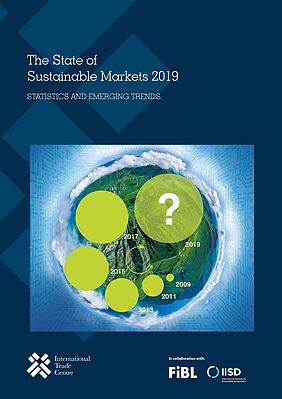Consumers, buyers and manufacturers of agricultural and forestry products keep turning to standard-compliant goods to tackle social and environmental concerns. The market for sustainably certified goods continues to expand steadily, and more farmland than ever before is being used to grow certified crops including cotton, coffee and cocoa beans.
'The State of Sustainable Markets 2019: Statistics and Emerging Trends' provides a snapshot of substantial growth of sustainability standards for bananas, cocoa, coffee, cotton, oil palm, soybean, sugarcane, tea and forestry products. It points out that the share of certified agricultural land is expanding and that this trend likely to continue.
Social and environmental concerns
A joint publication by the International Trade Centre, the Research Institute of Organic Agriculture (FiBL) and the International Institute for Sustainable Development, the fourth edition of the State of Sustainable Markets presents data on area, production volume and number of producers that comply with a sustainability standard. The complete findings of the report – the only global publication highlighting sustainable market trends – can be found on a new interactive website featuring data from 14 of the world’s leading standards organizations (see link below).
"Unsustainable consumption and production deplete natural resources and can exacerbate inequalities between and within societies," said ITC Executive Director Arancha González. "To deliver on the 2030 agenda and to protect our planet over the long term, our collective challenge must be to consume, produce and trade sustainably."
The report – funded by SECO, the Swiss State Secretariat for Economic Affairs, and launched in conjunction with the sixth Trade for Sustainable Development Forum taking place in Geneva on 7-9 October and World Cotton Day, which was celebrated on 7 October – helps shape decisions of policymakers, producers and businesses to address systemic labour and environmental challenges through standard-compliant and sustainable production. Sustainability standards can help address several challenges ranging from labour issues and loss of biodiversity in the banana and sugarcane sectors for instance, to deforestation, soil erosion and the use of agro-chemicals in the tea market.
Sustainability standards are most often third party-assessed norms and requirements linked to environmental, social, ethical and food safety issues. There are more than 400 such standards across the globe, and they represent an opportunity along international supply chains to meet resource shortfalls, the report says.
Cotton: triple-digit growth in certified land
The report notes that in the past five years, land area dedicated to growing certified cotton has grown by 172 %. Meanwhile, land certified as sustainable for sugarcane grew by 80 %, whereas for cocoa, it more than doubled.
In 2016–2017, the certified areas for the nine commodities increased at least 18 %, led by sugarcane and cotton. At least 17.9 million hectares of farmland for nine agricultural crops singled out in this report were certified in 2017, equalling 7.6 % of the total area for them.
Organic farmland covers the greatest area. In fact, almost 70 million hectares – roughly the size of Myanmar – were certified as organic in 2017, representing 1.4 % of the world’s farmland– but most of the other standards have grown more in recent years.
Single-commodity standards dominate
The report finds that single-commodity standards such as Better Cotton Initiative, 4C, Roundtable on Sustainable Palm Oil and Round Table on Responsible Soy are by far the largest standards in the coffee, cotton, forestry, oil palm, sugarcane and soybean sectors. It suggests that standards that directly target mainstream adoption within a specific sector largely drive growth and market uptake.
The rising area and production volume covered by sustainability standards signals that there is "significant potential for further growth", according to the report.
The 14 standards organizations that provided data for the report are 4C, Better Cotton Initiative, Bonsucro, Cotton made in Africa, GLOBALG.A.P., Fairtrade International, Forest Stewardship Council, IFOAM – Organics International, the Programme for the Endorsement of Forest Certification, ProTerra Foundation, Rainforest Alliance, the Roundtable on Sustainable Palm Oil, the Round Table on Responsible Soy and UTZ.
New interactive data
For the first time, The State of Sustainable Markets provides a summary of the key information obtained from the study. Country, sector and sustainability standard-specific interactive graphs are available on the online platform Sustainability Map under the ‘Market Trends’ module (see link below).
This media release was published by the International Trade Centre ITC on 8 October 2019.
Further information
FiBL contact
- Helga Willer, FiBL Switzerland
- Julia Lernoud, FiBL Switzerland
IISD contact
Vivek Voora, International Institute for Sustainable Development
E-mail: vivek.voora(at)iisd.net
ITC contact
Gregory Sampson, International Trade Centre
E-mail: sampson(at)intracen.org
Links
- intracen.org: Download "The State of Sustainable Markets 2019"
- sustainabilitymap.org: Interactive data of the key information from "The State of Sustainable Markets"
- intracen.org: Original media release on the International Trade Centre website
About ITC
The International Trade Centre is the joint agency of the World Trade Organization and the United Nations. ITC assists small and medium-sized enterprises in developing and transition economies to become more competitive in global markets, thereby contributing to sustainable economic development within the frameworks of the Aid-for-Trade agenda and the United Nations' Sustainable Development Goals.




